This article was co-authored by Kirsten Thompson, MD. Dr. Kirsten Thompson is a Board Certified Psychiatrist, Clinical Instructor at UCLA, and the Founder of Remedy Psychiatry. She specializes in helping patients with mental health conditions such as major depressive disorder, anxiety, ADHD, bipolar disorder, OCD, PTSD, and postpartum depression. Dr. Thompson holds a BS in Operations Research Industrial Engineering from Cornell University and an MD from The State University of New York, Downstate College of Medicine.
There are 10 references cited in this article, which can be found at the bottom of the page.
wikiHow marks an article as reader-approved once it receives enough positive feedback. This article received 24 testimonials and 86% of readers who voted found it helpful, earning it our reader-approved status.
This article has been viewed 1,687,775 times.
You may have heard Xanax is a good drug to use for anxiety and other disorders. That much is true. However, most doctors will not readily hand out prescriptions for this drug because it does come with some problems. Therefore, you will need to convince your doctor that you actually need the drug, mainly by showing that you have an anxiety disorder.
Steps
Talking to Your Doctor or Psychiatrist
-
1Talk to your regular doctor about your anxiety. Sometimes anxiety can actually be a symptom of some other illness. Therefore, your doctor should check you out first. For instance, psychological symptoms can be a symptom of a neurological problem. They can also be the result of a medication you're taking.[1]
-
2Describe your symptoms thoroughly. Though it may be embarrassing to you to talk about how pervasive your anxiety is, your doctor needs to know the full extent of the problem. In fact, it might be helpful if you keep a journal of when you are having negative thoughts and the results, such as it stopped you from enjoying the moment or from going on an outing.[2]Advertisement
-
3Ask about a psychiatrist. Once your regular doctor checks you out, she will often recommend you see a psychiatrist, since psychiatrists are more qualified to prescribe psychiatric drugs. Therefore, if your doctor doesn't make a recommendation, ask about seeing a psychiatrist.[3]
-
4Describe your symptoms to the psychiatrist. Like you did with your regular doctor, you'll need to describe your symptoms thoroughly. You'll also need to be able to talk about their effect on your life.[4]
- You need to be comfortable enough to talk freely about your symptoms. If the psychiatrist you see at first is not a good fit, don't be afraid to find another one.[5]
-
5Ask for a prescription. You need to approach this topic delicately, since the doctor may become suspicious if she thinks you came in just to get this medication; as noted, Xanax is often abused. However, it doesn't hurt to ask for what you want.
- For instance, you could say, "I've heard Xanax and other drugs like it can help with anxiety. Would that be an option for me?"
- Never lead with this question with any doctor. Talk about your problems first, to help establish that you really do need it.
-
6Ask about Xanax as a sleep aid. Another option is to ask for Xanax as a sleep aid in relation to anxiety. Some people take a very small dose before bedtime to help them sleep. Once again, never lead with a request for the prescription. First, describe how you have trouble sleeping due to racing thoughts or anxiety, then move on to asking if Xanax could be a possible solution.
Recognizing Signs of Anxiety
-
1Know how anxiety can feel. You may feel like everything is going wrong or is about to go wrong, and you can do nothing to stop it. Alternatively, you may feel a sense of panic about the situations in your life.[6] [7]
- Some people feel like they are always on edge or that everything in life can lead to something horrible.[8]
- Some people have Stop panic attacks, which are a sudden onset of fear that can feel overwhelming.[9]
-
2Watch for feelings of nervousness or powerlessness. Though everyone feels anxious from time to time, anxiety that is persistent and pervasive is a bit more serious. If you have had major anxiety in your life for half a year or more, you should talk to your doctor about it.
-
3Pay attention to the physical manifestations. Anxiety doesn't just manifest in psychological ways; you'll also notice physical symptoms. For instance, you may shake, sweat, or breathe too quickly. You may also have a rapid heart beat.[10] In addition, you could feel very tired, or you may not be able to focus on what you need to do.
- You could also have symptoms such as stomach problems, dizziness, headaches, or even chest pain.
-
4Note how much it affects your life. If you are just upset by anxiety every once and a while with few side effects, that likely means you don't have an anxiety disorder. However, if your anxiety affects your life everyday, whether by consuming your thoughts or stopping you from doing things, you may have an anxiety disorder.
-
5Understand anxiety can appear in different ways. Depending on the type of disorder you have, your anxiety can look somewhat different. In addition, what triggers it can vary widely from person to person, or it may have no trigger at all.
- Generalized anxiety disorder means you may feel excessive worry about your everyday life, even if nothing bad is happening at the moment.
- Panic disorder is when you suddenly have attacks of fear or anxiety that often last for just a few minutes but can last much longer.
- Social phobia is essentially a fear of being embarrassed. This embarrassment may keep you from doing certain things or going where you may want to go because you're afraid you'll do something embarrassing.
- Focused phobias are a fear of one particular thing or several things; in other words, when you are exposed to your phobia, you have fear or anxiety.
Understanding Xanax
-
1Know what it is. Xanax is a type of sedative.[11] It belongs in a class of drugs called benzodiazepines, which in turn are grouped under central nervous system depressants.[12]
- The active ingredient in Xanax is Alprazolam, which essentially slows down your central nervous system, that is why it's considered a tranquilizer. It does this by binding to receptors in your brain, stimulating production of GABA.[13] GABA is a naturally occuring neurotransmitter that reduces the activity of neurons to which it binds.
-
2Understand what Xanax is prescribed for. Most often, Xanax is prescribed for anxiety.[14] You may also have it prescribed for panic disorder, though sometimes doctors are reluctant to prescribe it for this condition, as you often get panic attacks when you are relaxed.[15] Sometimes, it is used a sleep aid in a mild dosage.[16]
- Xanax can stop or lessen panic attacks.
- Xanax can get you through a crisis, such as a stressful exam or difficult meeting. The correct dosage will get your anxiety out of your way so you can focus properly.
- It treats the symptoms, not the cause. Xanax is not a cure for an anxiety disorder. Talk with your doctor about what treatments can help you in the long term.
-
3
Expert Q&A
-
QuestionIs Xanax a sedative?
 Kirsten Thompson, MDDr. Kirsten Thompson is a Board Certified Psychiatrist, Clinical Instructor at UCLA, and the Founder of Remedy Psychiatry. She specializes in helping patients with mental health conditions such as major depressive disorder, anxiety, ADHD, bipolar disorder, OCD, PTSD, and postpartum depression. Dr. Thompson holds a BS in Operations Research Industrial Engineering from Cornell University and an MD from The State University of New York, Downstate College of Medicine.
Kirsten Thompson, MDDr. Kirsten Thompson is a Board Certified Psychiatrist, Clinical Instructor at UCLA, and the Founder of Remedy Psychiatry. She specializes in helping patients with mental health conditions such as major depressive disorder, anxiety, ADHD, bipolar disorder, OCD, PTSD, and postpartum depression. Dr. Thompson holds a BS in Operations Research Industrial Engineering from Cornell University and an MD from The State University of New York, Downstate College of Medicine.
Board Certified Psychiatrist Kind of, but not entirely! Xanax belongs to a group of drugs called benzodiazepines, which are used to treat anxiety and panic disorders. Xanax helps increase a brain chemical called GABA, which helps promote a calm and relaxed state of mind.
Kind of, but not entirely! Xanax belongs to a group of drugs called benzodiazepines, which are used to treat anxiety and panic disorders. Xanax helps increase a brain chemical called GABA, which helps promote a calm and relaxed state of mind.
Warnings
- It's not a good idea to go off Xanax all at once. You should wean yourself off this drug under the guidance of a doctor. If you don't, you may end up with withdrawal symptoms, such as tremors, sweating, nervousness, and even seizures.[19]⧼thumbs_response⧽
- Xanax can temporarily ease anxiety and stop panic attacks, allowing you to get rid of your anxiety short-term so you can handle a situation without stress getting in your way. It will not cure an anxiety disorder. Seek therapy and/or long-term medication for your disorder in order to live a healthier, happier life.⧼thumbs_response⧽
- DO NOT convince your doctor to prescribe you Xanax for any reason other than treatment. If you thinking that you or someone you know may be addicted to Xanax and is manipulating their doctor or therapist to have it prescribed to them, call an addiction hotline or find other means of assistance immediately.⧼thumbs_response⧽
- Do not use alcohol or other CNS depressants while taking Alprazolam, as Alprazolam itself is a CNS depressant and simultaneous use of more CNS depressants increases their effect leading to side effects including tachycardia, arrhythmia, muscle weakness, coma, acute blood toxicity, and liver failure. These are very serious complications which often result in death.⧼thumbs_response⧽
- Do not eat grapefruits or drink grapefruit juice while taking Alprazolam. This may increase the amount of the active ingredient entering your system and slow down its elimination.⧼thumbs_response⧽
References
- ↑ http://www.clinicaladvisor.com/features/separating-anxiety-from-physical-illness/article/117767/
- ↑ http://www.nimh.nih.gov/health/topics/anxiety-disorders/index.shtml
- ↑ http://www.nimh.nih.gov/health/topics/anxiety-disorders/index.shtml
- ↑ http://www.nimh.nih.gov/health/topics/anxiety-disorders/index.shtml
- ↑ http://www.nimh.nih.gov/health/topics/anxiety-disorders/index.shtml
- ↑ Kirsten Thompson, MD. Board Certified Psychiatrist. Expert Interview. 18 August 2021.
- ↑ http://www.mayoclinic.org/diseases-conditions/anxiety/basics/symptoms/con-20026282
- ↑ http://www.helpguide.org/articles/anxiety/anxiety-attacks-and-anxiety-disorders.htm
- ↑ http://www.helpguide.org/articles/anxiety/anxiety-attacks-and-anxiety-disorders.htm
- ↑ Kirsten Thompson, MD. Board Certified Psychiatrist. Expert Interview. 18 August 2021.
- ↑ http://www.mayoclinic.org/diseases-conditions/anxiety/basics/treatment/con-20026282
- ↑ http://www.mayoclinic.org/drugs-supplements/alprazolam-oral-route/description/drg-20061040
- ↑ Kirsten Thompson, MD. Board Certified Psychiatrist. Expert Interview. 18 August 2021.
- ↑ Kirsten Thompson, MD. Board Certified Psychiatrist. Expert Interview. 18 August 2021.
- ↑ http://www.clinicaladvisor.com/features/separating-anxiety-from-physical-illness/article/117767/
- ↑ https://www.psychologytoday.com/blog/fighting-fear/201206/the-use-the-minor-tranquilizers-xanax-ativan-klonopin-and-valium
- ↑ http://www.nlm.nih.gov/medlineplus/druginfo/meds/a684001.html
- ↑ http://www.nytimes.com/2011/09/14/us/in-louisville-a-centers-doctors-cut-off-xanax-prescriptions.html?_r=1&emc=eta1
- ↑ http://www.nlm.nih.gov/medlineplus/druginfo/meds/a684001.html
About This Article
To get prescribed Xanax, talk to your doctor to discuss your anxiety and figure out which treatment option will be best for you. It may be difficult, but make sure to describe all your symptoms thoroughly, such as nervousness, panic, dizziness and shortness of breath, so they can best help you. Once you talk to your doctor about your anxiety, they may give you a recommendation for a psychiatrist, since psychiatrists are even more qualified to prescribe psychiatric drugs. Just make sure to tell your doctor or psychiatrist about any other medications you’re taking, since some drugs can interact badly with Xanax. To learn how to use Xanax as a sleep aid, read on!
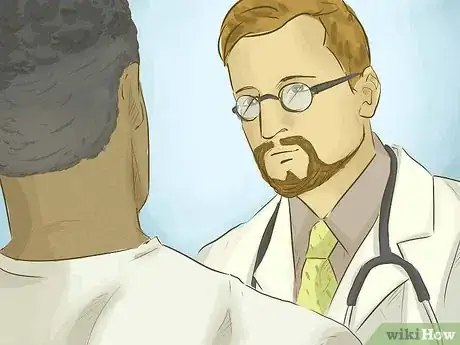
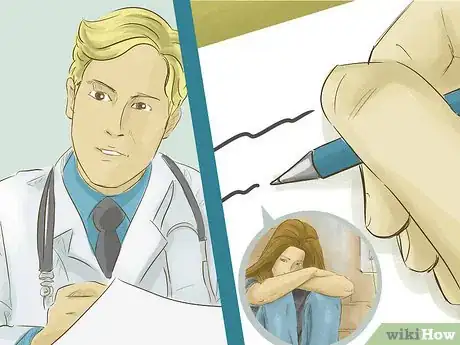
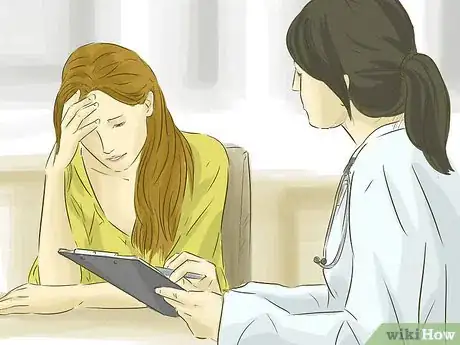
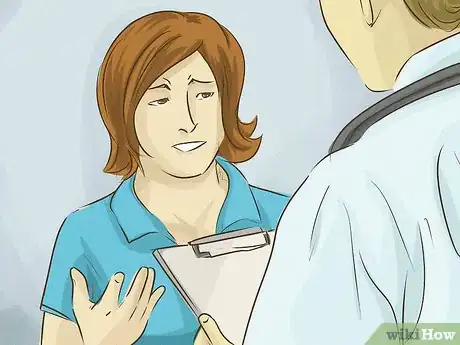
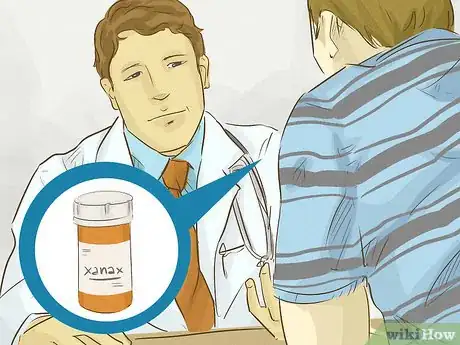
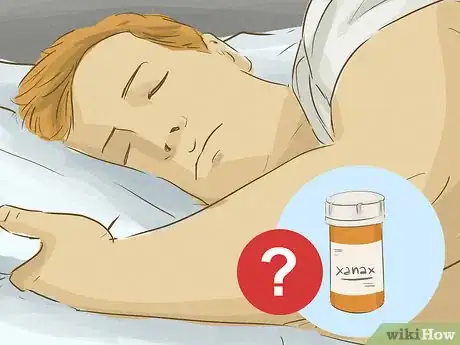


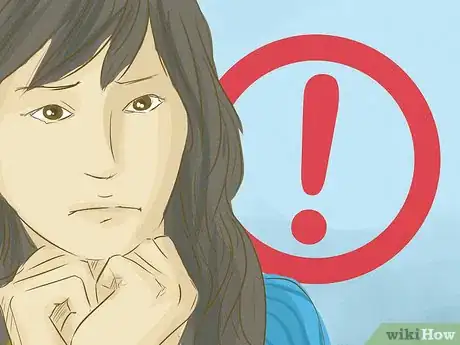
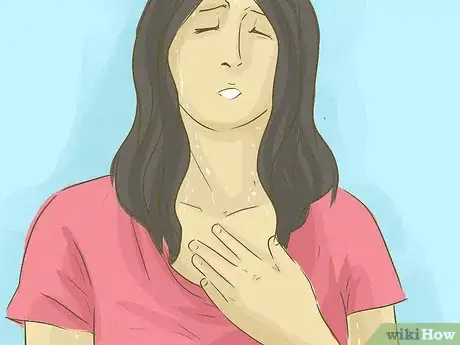

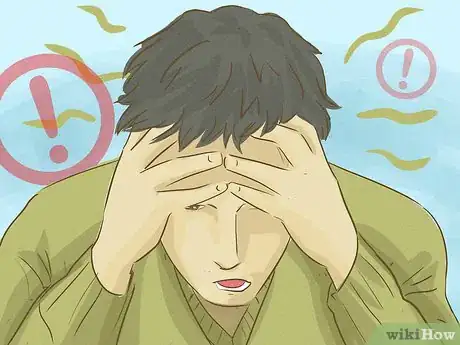
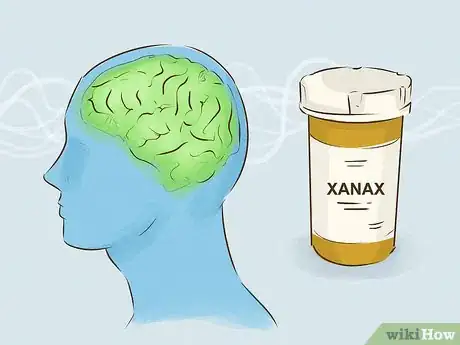
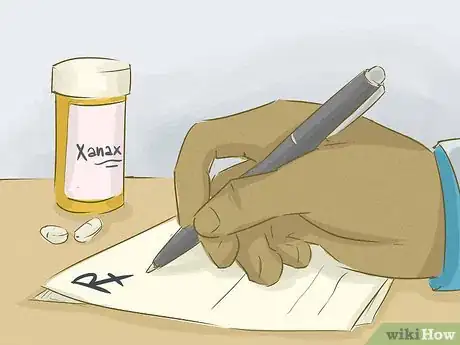
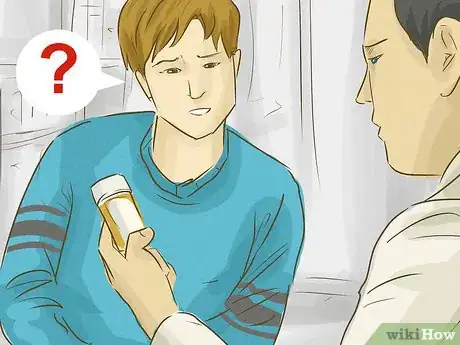
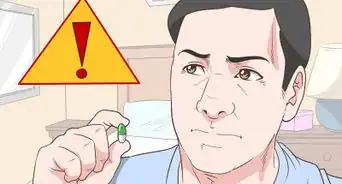

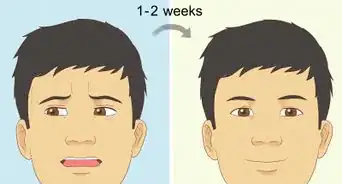

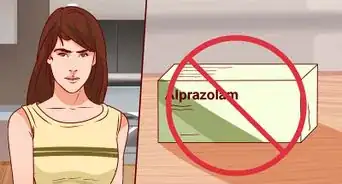
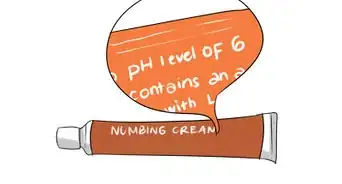












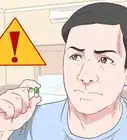


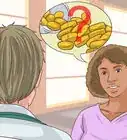



































Medical Disclaimer
The content of this article is not intended to be a substitute for professional medical advice, examination, diagnosis, or treatment. You should always contact your doctor or other qualified healthcare professional before starting, changing, or stopping any kind of health treatment.
Read More...